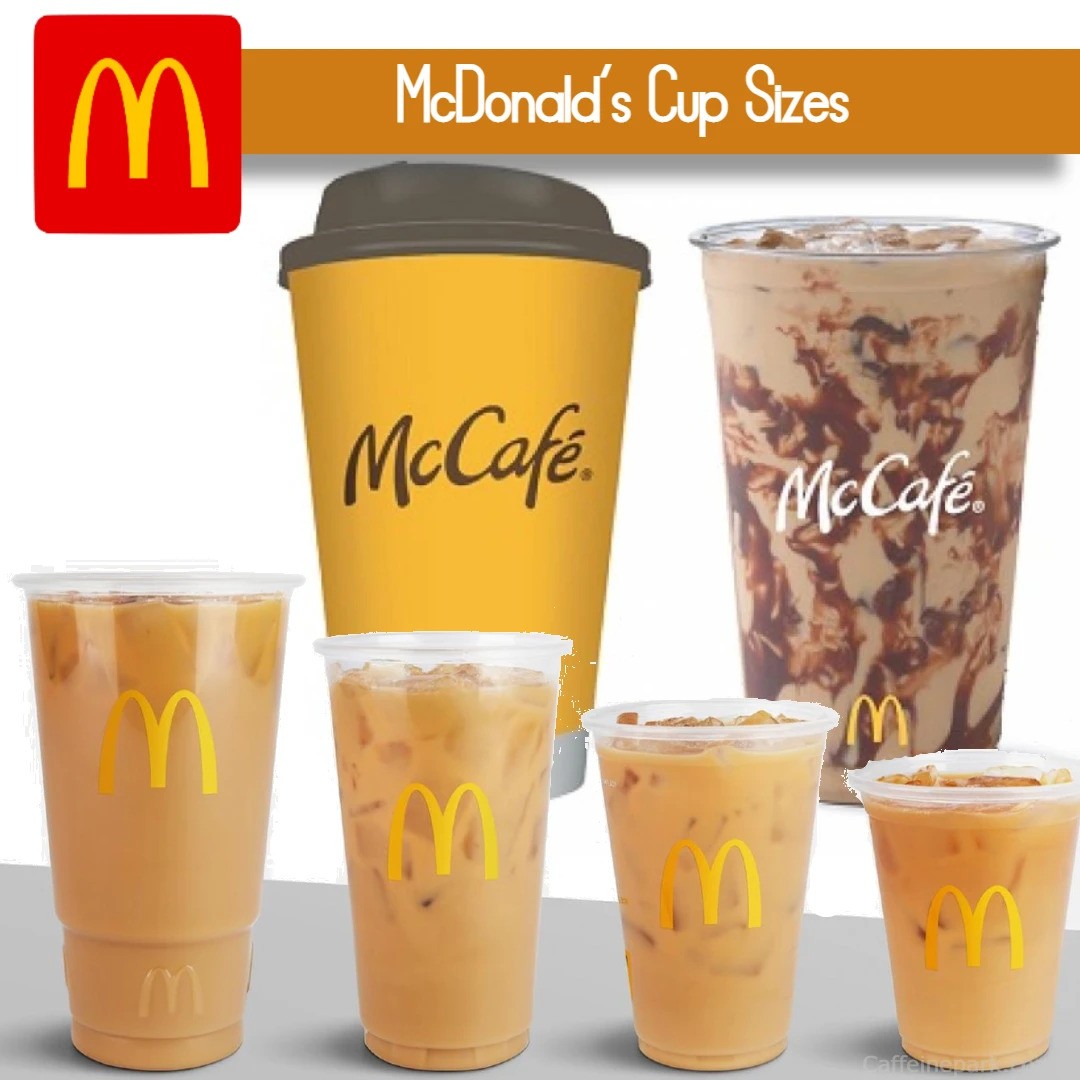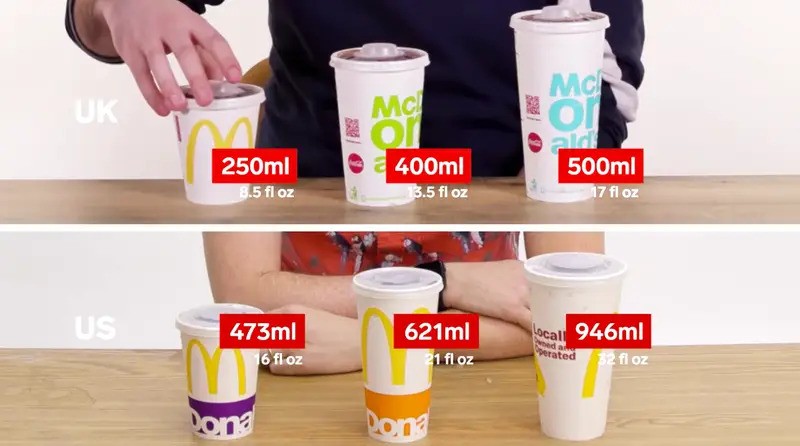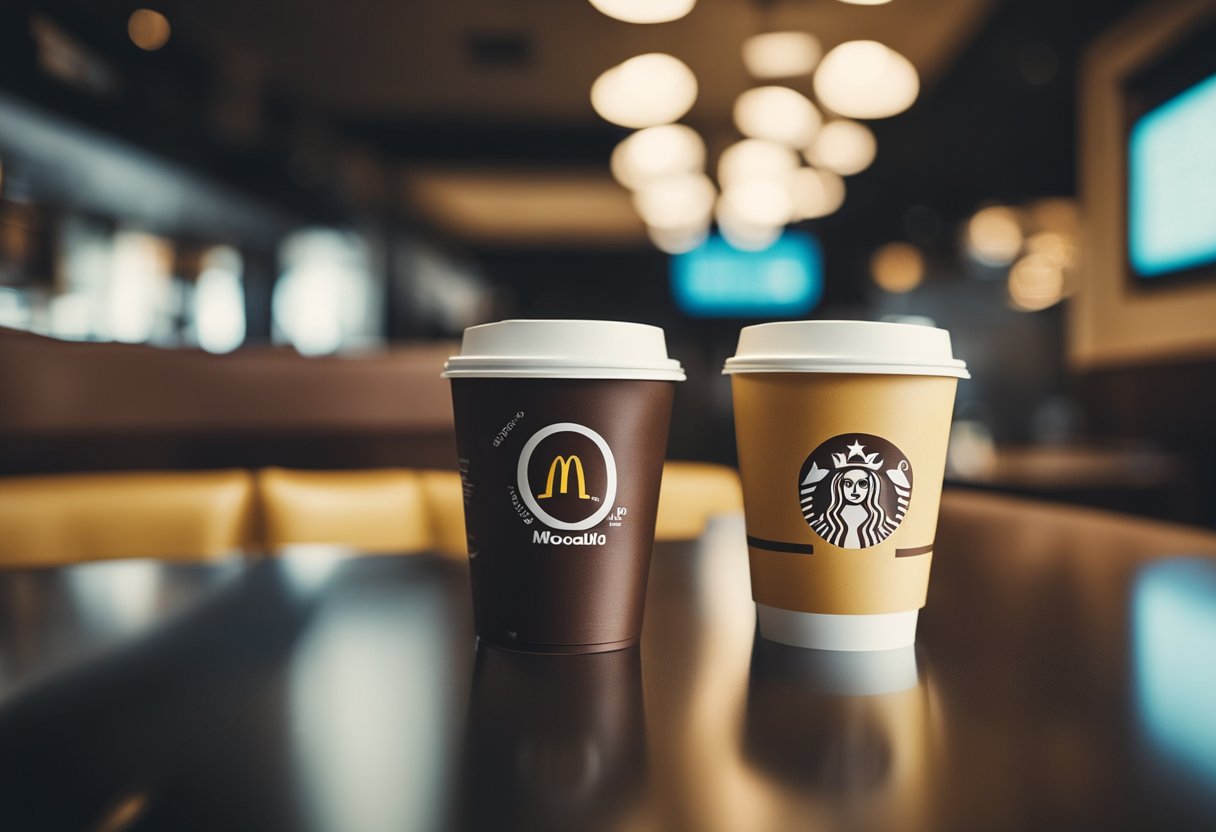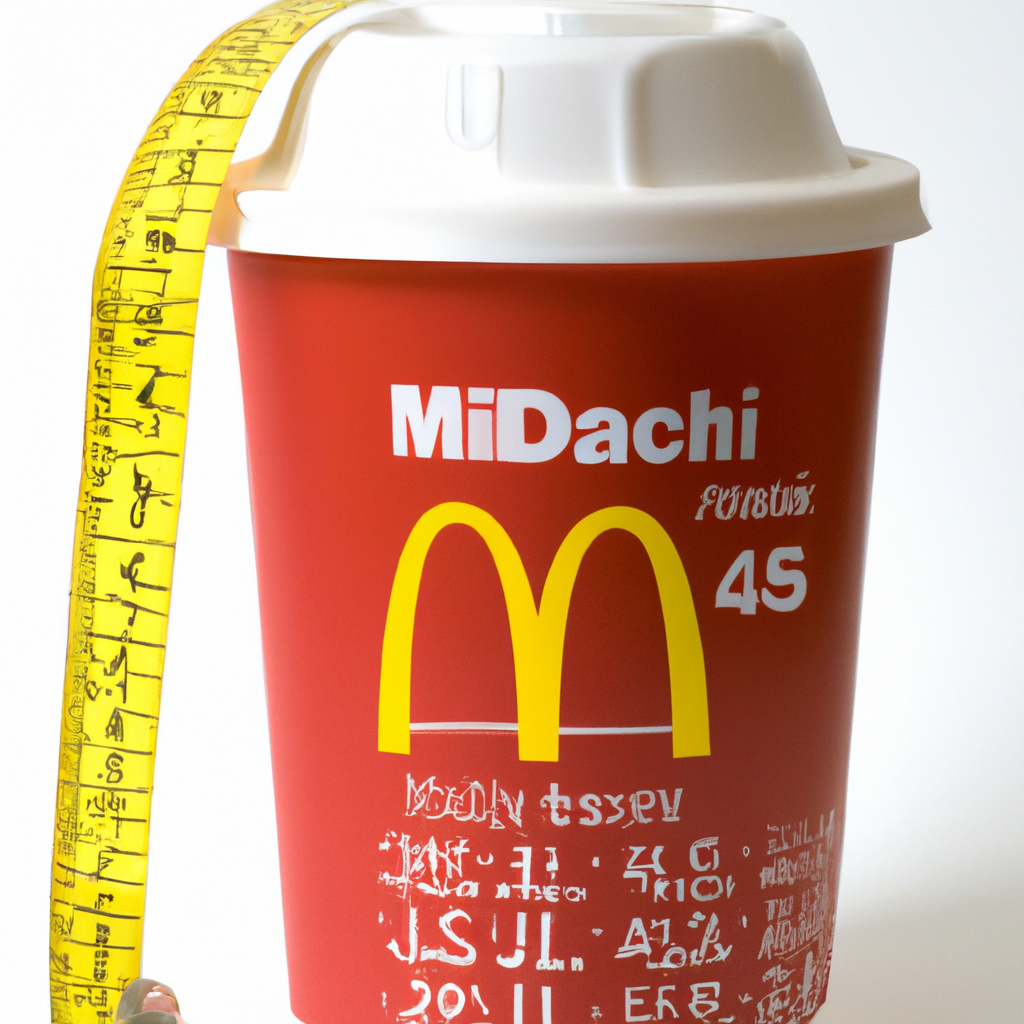
Did you know that a large McDonald's cup holds more than just your favorite soda? It also reflects global beverage trends and consumer habits.
McDonald's is one of the most popular fast-food chains, serving millions of drinks daily. Understanding how many ounces are in a large McDonald's cup helps customers make informed choices about portion sizes, health, and value.
In this post, we’ll break down McDonald's drink sizes, compare regional variations, and explore how cup sizes impact sustainability and consumer preferences. Whether you're curious about McDonald's large cup ounces or just love a good soda, this guide has you covered!
Overview of McDonald's Drink Sizes
McDonald's offers customers multiple drink size options across their beverage menu. These sizes vary based on both location and drink type, creating a somewhat complex system worth understanding before placing your order.
Range of Sizes Available
McDonald's typically provides three standard cup sizes:
Small: 12-16 ounces
Medium: 16-21 ounces
Large: 20-32 ounces
These measurements represent general ranges because cup volume differs by beverage category and country.
Focus on Large Size Options
The large size represents McDonald's most substantial beverage offering. It provides maximum value for customers seeking quantity. Large drinks typically cost only $0.30 more than medium sizes while delivering 9 additional ounces – making them popular choices for value-conscious consumers.
Pro Tip: A large McDonald's cup holds nearly four standard 8-ounce cups worth of liquid!
Variations in Large Size by Beverage Type
McDonald's large size isn't consistent across all drink categories. The precise volume varies significantly depending on your beverage choice:
| Drink Type | Large Size (oz) |
| Soda | 30-32 oz |
| Coffee (Hot) | 21 oz |
| Coffee (Iced) | 32 oz |
| Smoothie | 22 oz |
| Sweet Tea | 32 oz |
| Mango Pineapple Smoothie | 30 oz |
| Frozen Strawberry Lemonade | 32 oz |
These differences reflect each beverage's unique characteristics. Coffee, being more concentrated, comes in smaller portions. Sweet tea and sodas offer larger volumes since they contain significant ice.
Regional variations exist too. European McDonald's locations typically serve smaller "large" drinks than their American counterparts. Some Middle Eastern locations offer even larger options beyond the standard large size.
The actual liquid amount also depends on:
Ice volume
Foam level
Cup shape
Carbonation
When ordering, remember these factors affect your final drink volume. For maximum beverage, request light ice or no ice in your cup!

Factors Affecting Actual Liquid Amount
When ordering a large drink at McDonald's, the nominal cup size doesn't always match the actual liquid volume received. Several key factors influence the final amount of beverage in your cup.
Ice Volume Impact
Ice dramatically reduces the actual beverage amount in any McDonald's cup. A standard fill includes approximately ⅓ ice, potentially decreasing liquid volume by 25-40%.
Key ice considerations include:
Standard fill: McDonald's employees follow specific guidelines for ice amounts
Temperature maintenance: Ice helps maintain optimal drinking temperature
Space displacement: Each ice cube directly replaces potential liquid
Melting factor: Ice eventually melts, slightly increasing liquid volume
Pro Tip: Request "light ice" or "no ice" to maximize beverage quantity. This simple adjustment can increase your drink volume by up to 40%!
Foam and Carbonation Effects
Carbonated beverages create additional variables affecting liquid volume:
Foam creation: The pouring process generates foam, occupying significant cup space
Bubble expansion: Carbonation bubbles increase total volume while decreasing liquid content
Settlement time: Foam gradually converts back to liquid, increasing available drink
The impact varies by beverage type:
| Beverage | Foam/Carbonation Effect |
| Soda | Medium (10-15% volume reduction) |
| Coffee | High for cappuccinos (20-30% reduction) |
| Smoothies | Low (minimal impact) |
| Tea | None (no volume reduction) |
Cup Shape and Design Considerations
McDonald's employs different cup designs across their beverage lineup. These variations significantly impact actual liquid capacity:
Tapered designs: Coffee cups narrow at the bottom, creating visual size illusion
Ridged structures: Some cups feature internal ridges reducing capacity
Base thickness: Thicker cup bottoms decrease internal volume
Headspace allowance: Space left at top prevents spillage but reduces capacity
Combined Volume Impact
These factors collectively alter the advertised cup sizes. A 32-ounce large soda cup might contain:
Optimal scenario (no ice): 30-32 oz liquid
Standard serve (⅓ ice, moderate carbonation): 18-22 oz liquid
Maximum reduction (heavy ice, high carbonation): 15-18 oz liquid
Understanding these variables helps set realistic expectations when ordering. For maximum beverage volume, consider:
Requesting no ice
Choosing non-carbonated options like sweet tea
Filling your cup completely at self-service stations
Allowing carbonated beverages to settle before drinking
These factors explain why two identical-sized cups might deliver significantly different drink amounts. The actual liquid received varies substantially based on beverage type, preparation method, and personal customization requests.

Comparisons to Other Fast Food Chains
McDonald's large cup sizes represent just one standard in the competitive fast food market. Understanding how these compare to other major chains helps consumers make informed choices when seeking maximum beverage value.
Similar Sizes at Major Competitors
Most major fast food chains offer comparable sizing structures to McDonald's three-tier system (small, medium, large). However, the actual volume contained in each size category varies significantly between companies.
Popular chains maintain the following large cup standards:
Burger King: 30 oz large soda
Wendy's: 32 oz large soda
Taco Bell: 30 oz large soda
KFC: 30 oz large soda
Chick-fil-A: 32 oz large soda
These measurements reveal industry convergence around the 30-32 oz standard for carbonated beverages. This pattern developed through decades of competitive positioning, customer expectations, and operational efficiency requirements.
Key Differences Across Chains
Despite similar large cup volumes for sodas, notable differences exist across chains:
Coffee sizes vary dramatically: Starbucks offers a 20 oz "Venti" as their large size - smaller than McDonald's 21 oz large hot coffee
Regional chains maintain unique standards: Culver's offers a 32 oz large, while In-N-Out caps their largest size at 20 oz
Specialty drink variations: Smoothie chains like Jamba Juice use different measurements entirely, basing sizes on 16/22/30 oz standards
International differences: Tim Hortons (Canada) serves 20 oz large coffees, slightly smaller than McDonald's US offerings
The terminology itself changes between brands. Starbucks famously uses "Tall," "Grande," and "Venti" rather than small, medium, and large - creating potential consumer confusion when comparing sizes.
Comparative Analysis of Large Drink Sizes
This table highlights large drink size differences across major fast food and coffee chains:
| Chain | Large Soda (oz) | Large Hot Coffee (oz) | Large Iced Coffee (oz) |
| McDonald's | 30-32 | 21 | 32 |
| Burger King | 30 | 20 | 30 |
| Wendy's | 32 | 20 | 32 |
| Starbucks | N/A | 20 ("Venti") | 24 ("Venti") |
| Dunkin' | 32 | 24 | 32 |
| Tim Hortons | 20 | 20 | 24 |
| Taco Bell | 30 | N/A | N/A |
| Subway | 30 | 16 | 30 |
The data reveals McDonald's positions their large beverages competitively against major rivals. They offer standard or slightly larger portion sizes across most categories.
Most chains' large soda sizes hover around 30-32 ounces, creating an unofficial industry standard. Coffee sizes show greater variation, reflecting different positioning strategies and target customers.

International McDonald's Drink Sizes
McDonald's adapts its beverage sizing globally to accommodate cultural preferences, local regulations, and regional drinking habits. These variations create a fascinating tapestry of cup sizes across their 38,000+ restaurants worldwide.
Variations in Sizing and Names
What Americans consider "large" might be viewed as excessive in other countries. McDonald's adjusts accordingly:
United States: Standard large soda = 30-32 oz
United Kingdom: Large soda = 22 oz (31% smaller than US)
Japan: Large soda = 17 oz (nearly half US size)
Australia: Large = 21 oz
Canada: Large = 32 oz (matches US)
India: Large ranges from 10-17 oz
These differences extend beyond simple volume measurements. Terminology shifts across borders too. A "medium" drink in the US might be labeled "large" in European markets. Japanese McDonald's locations often cap their largest size at what Americans would consider a small or medium.
Interesting Fact: Japan discontinued their "large" option for several years due to changing consumer preferences for smaller portions.
Unique Drink Offerings by Region
McDonald's adapts beverages to match local tastes, resulting in country-specific cup sizes:
| Country | Unique Drink | Size (oz) |
| Japan | Melon Fanta | 17 oz (large) |
| Germany | Beer | 16 oz (single size) |
| Italy | Espresso | 4 oz (single size) |
| India | Masala Tea | 12 oz (large) |
| Hong Kong | Milk Tea | 16 oz (large) |
| Philippines | Pineapple Sprite | 22 oz (large) |
These specialty drinks receive custom cup designs reflecting both practical considerations and cultural significance. Hong Kong's milk tea, for example, comes in cups specifically designed for tea service rather than standard soda containers.
Cultural Differences in Portion Expectations
Cup size variations reflect deeper cultural attitudes toward food, value, and consumption:
North American "value culture" drives larger portions. Americans expect substantial volume when paying premium prices.
European concern for moderation influences smaller cup sizes. Many European countries view excessive portion sizes negatively.
Asian focus on quality over quantity results in smaller, more concentrated beverages. Japanese consumers often prefer savoring smaller portions.
Middle Eastern preference for abundance leads some locations to offer super-sized options exceeding American standards.
Health regulations in countries like France and Mexico restrict maximum beverage sizes, directly impacting available options.
Public health initiatives worldwide increasingly pressure McDonald's to reduce drink sizes. Several European countries have implemented voluntary or mandatory size reductions over concerns about sugar consumption and obesity.
McDonald's adaptation strategy balances global brand consistency against local preferences. They maintain recognizable small-medium-large terminology while adjusting actual volumes to meet regional expectations. This flexible approach helps them succeed across diverse markets despite dramatically different beverage consumption patterns.
When traveling internationally, expect significant differences in what constitutes a "large" McDonald's drink. The familiar golden arches remain consistent, but cup sizes reflect each culture's unique relationship beverage consumption.
Additional Size Information
McDonald's offers a diverse range of cup sizes beyond their standard small/medium/large categories. These specialized sizes accommodate different customer needs, from children's portions to seasonal promotional offerings.
Kid's Drink Sizes
McDonald's designs kid-friendly portions specifically for younger customers:
Standard Kid's Size: 12 oz (355 ml)
Happy Meal Default: 12 oz cup
Material: Same as adult cups but smaller scale
Content: Approximately 1.5 cups of beverage
These 12-ounce cups provide appropriate portions for children. They contain significantly less liquid than adult sizes, reducing sugar consumption and potential waste. Parents appreciate these right-sized options designed for smaller appetites.
Specialty Beverage Sizes
McDonald's adjusts cup sizes for specialty beverages based on product characteristics:
| Beverage Type | Large Size (oz) | Notes |
| Milkshakes | 22 oz | Thicker consistency requires different cup design |
| McFlurry | 12 oz | Single size only, no small/medium/large options |
| Orange Juice | 16 oz | Maximum size available |
| Apple Juice | 12 oz | Only available in single size |
| Hot Chocolate | 16 oz | Maximum size available |
| Frappé | 22 oz | Matches standard smoothie size |
Milkshakes deserve special attention. These creamy treats come in significantly smaller "large" cups compared to sodas. Their 22-ounce large size reflects their rich, filling nature. The specialized cup design accommodates thicker consistency while maintaining structural integrity.
McCafé specialty drinks follow their own sizing convention, typically stopping at 20-24 ounces maximum due to preparation methods and ingredient costs.
Alternative Sizing Options
Select McDonald's locations offer non-standard cup sizes under specific circumstances:
Historical Super Size (Discontinued)
Regional Giant Options
"McGulp" size (128 oz) available in select US markets
Equivalent to one gallon of beverage
Primarily sold as novelty or group-sharing option
Limited-Time Promotional Cups
Movie tie-in collectible cups often feature alternative sizes
Summer promotions might include oversized options
Holiday specials sometimes feature unique cup dimensions
Local Adaptations
Some franchise owners offer non-standard sizes
Desert locations might provide larger options
University campus locations often feature bigger cups
These alternative sizes typically appear temporarily, responding to seasonal demands or special circumstances. They exist outside McDonald's standard menu but occasionally resurface through promotional campaigns.
Final Thought
A large McDonald's cup typically holds 30 ounces (887 ml), though some drinks, like sweet tea, may come in 32-ounce cups.
Understanding drink sizes helps customers choose wisely based on portion size, health considerations, and value.
Being an informed consumer means knowing how drink sizes vary by type and location.
Next time you order, pick the right size that fits your needs, preferences, and lifestyle!
Frequently Asked Questions
Q: Can you get a large drink for a dollar at McDonald's?
A: McDonald's occasionally runs "$1 Any Size Drink" promotions where large drinks cost the same as smaller options. These promotions vary by location and timing. Some franchises offer this deal year-round, while others limit it to summer months or specific promotional windows. During non-promotional periods, large drinks typically cost $1.29-$1.99 depending on location.
Q: Are large drinks refillable?
A: Yes, McDonald's offers free refills on fountain drinks and coffee for dine-in customers only. Refill restrictions include: available only during same visit, limited to identical beverage type, and not applicable for drive-through or takeout orders. Customers can use self-service stations where available without needing receipt or proof of purchase beyond having the original cup.
Q: How many ounces is a McDonald's medium soda?
A: A McDonald's medium soda contains 21 ounces (621 ml) in the United States. This size sits between the 16-ounce small and 30-ounce large options. Medium sizes provide a balance between portion size and value, offering 31% more beverage than small size for minimal additional cost (typically $0.10-0.20 more).
Q: What's the largest drink size McDonald's has ever offered?
A: The largest official McDonald's drink size was the "Super Size" – a 42-ounce cup discontinued in 2004 following health concerns and the documentary "Super Size Me." Some regional locations historically offered even larger options including the "Hugo" size (42 oz) and promotional "McGulp" (128 oz/1 gallon). Current corporate policy caps standard offerings at 30-32 ounces.
Q: How Many Sips Are in a Large McDonald's Drink?
A: The number of sips varies by individual drinking habits. With average sips of 0.5 oz, a large 30-oz McDonald's drink provides approximately 60 sips. Ice (reducing volume by ~30%) brings this down to about 42 sips. For customers taking larger 1-oz gulps, it provides around 30 sips. Most customers consume a large drink in 40-60 separate sips.
Q: Can You Get a Free Refill on a Large McDonald's Drink?
A: Yes, McDonald's offers free refills on all fountain drink sizes, including large cups, but only for dine-in customers. Refills require using the original cup during the same visit. The McDonald's app allows customers to order refills directly through their mobile device at participating locations. Drive-thru and delivery orders are not eligible for free refills.
Q: Are All McDonald's Drinks the Same Size Internationally?
A: No, McDonald's drink sizes vary significantly across countries. A US large soda is 30-32 oz, while UK large is 22 oz, Japan large is 17 oz, and Australia large is 21 oz. European locations typically offer smaller portions than North American ones, reflecting cultural differences, local regulations, and regional preferences for beverage consumption habits.
Q: Why Does McDonald's Soda Taste Better?
A: McDonald's sodas taste distinctive due to their meticulous beverage system: wider straws deliver more flavor, precise 34°F temperature control, carefully calibrated syrup ratios, advanced water filtration, and rigorous equipment maintenance. They receive syrup in stainless steel tanks rather than plastic bags and pre-chill both water and syrup before mixing, preserving carbonation while minimizing dilution from melting ice.




























